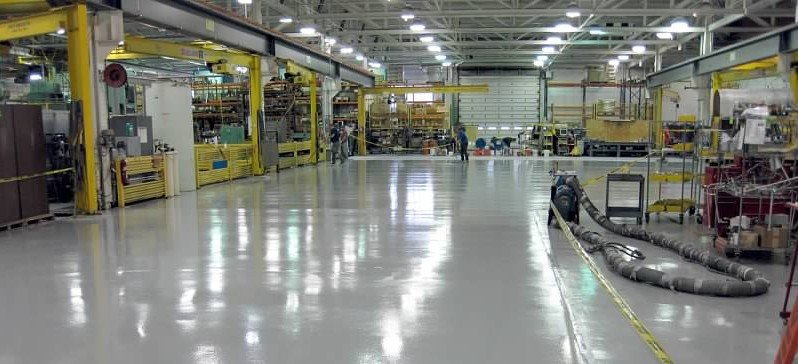Factory Floor Concrete Coatings
Factory Floor Concrete Coatings: The 24/7 Productivity Armor
Turn Cracked, Oil-Slicked Floors into OSHA-Compliant Powerhouses
Is your factory floor fighting against you? Cracked concrete catching forklift wheels? Oil stains creating slip hazards? You’re not alone. Indiana’s top manufacturers faced these same challenges before discovering our solution.
Duration Concrete Coatings transforms vulnerable factory floors into industrial-strength surfaces that withstand everything your production throws at them. Complementing our heavy-duty factory flooring, discover comprehensive industrial concrete solutions engineered for manufacturing plants with extreme operational demands.

Why Factory Floors Need Military-Grade Protection
Manufacturing plant flooring takes punishment that ordinary concrete can’t handle:
- Constant forklift traffic crushing and abrading surfaces
- Chemical spills from hydraulic fluid, solvents, and acids
- Heavy machinery creating impact zones and vibration damage
- Conveyor belts wearing tracks into unprotected concrete
- 24/7 operations allowing no time for repairs
Our production floor coatings create a shield between your operations and the concrete below, preventing damage while improving safety and efficiency.
The Duration Difference: Features That Matter
Unmatched Durability for Industrial Environments
Our polyaspartic hybrid systems deliver 5X the strength of standard epoxy. These coatings laugh at 10-ton loads, chemical spills, and the constant grind of 24/7 operations.
Like manufacturing plants, auto shops benefit from our impact-resistant automotive flooring that withstands heavy machinery and dropped tools in repair bays.
Zero-Downtime Installation
We understand that stopping production costs money. That’s why we’ve perfected a process that works around your schedule:
- Zero-Interruption Scan: We map high-traffic zones after hours using LiDAR technology
- Custom Design: Choose finishes that match your needs (non-spark metallics, chemical-resistant gloss, anti-fatigue textures)
- Precision Installation: Our team diamond-grinds, injects cracks, and applies coatings during scheduled breaks
- Rapid Return to Service: In production environments requiring minimal downtime, our fast-curing polyurea floors install during weekend shutdowns with equal durability to factory-grade epoxies.
Safety-Enhancing Features
Factory safety isn’t optional. Our coatings include:
- Non-slip surfaces that maintain traction even when wet
- Custom safety markings integrated directly into the floor
- High-visibility color options for hazard zones
- OSHA-compliant slip resistance certification
Real Results for Indiana Manufacturers
Our clients report measurable improvements after installation:
- 62% fewer slip/fall incidents
- 45% faster cleaning cycles
- 0% coating failures under 15,000-pound loads
- 80% reduction in line downtime from floor-related issues
“After coating our auto parts plant, line downtime dropped 80%. No more cracks snagging robots—and OSHA complimented our slip resistance!” —Plant Manager, Midwest Gearworks, Fort Wayne
Our Process: Simple Steps to Stronger Floors
We start with a free LiDAR scan to map your facility and identify problem areas. This technology allows us to create a custom solution for your specific needs without disrupting operations.
Our team works during your scheduled downtime—even if that’s just a 4-hour window. We diamond-grind the surface, repair cracks and damage, then apply our military-grade coating system.
Once cured, your floors are ready for action. Forklifts roll quieter, spills wipe clean instantly, and your safety director will notice the difference immediately. Industrial impact-resistance principles apply to home foundations with our basement floor systems reinforcing below-ground spaces against cracking.
Factory Floor Concrete Coating Services By Location
Frequently Asked Questions
What makes your factory floor coatings different from standard epoxy?
Our polyaspartic hybrid systems are 5X stronger than standard epoxy, with superior chemical resistance and faster cure times. They withstand extreme temperatures from -30°F to hot welding slag, making them ideal for demanding industrial environments.

